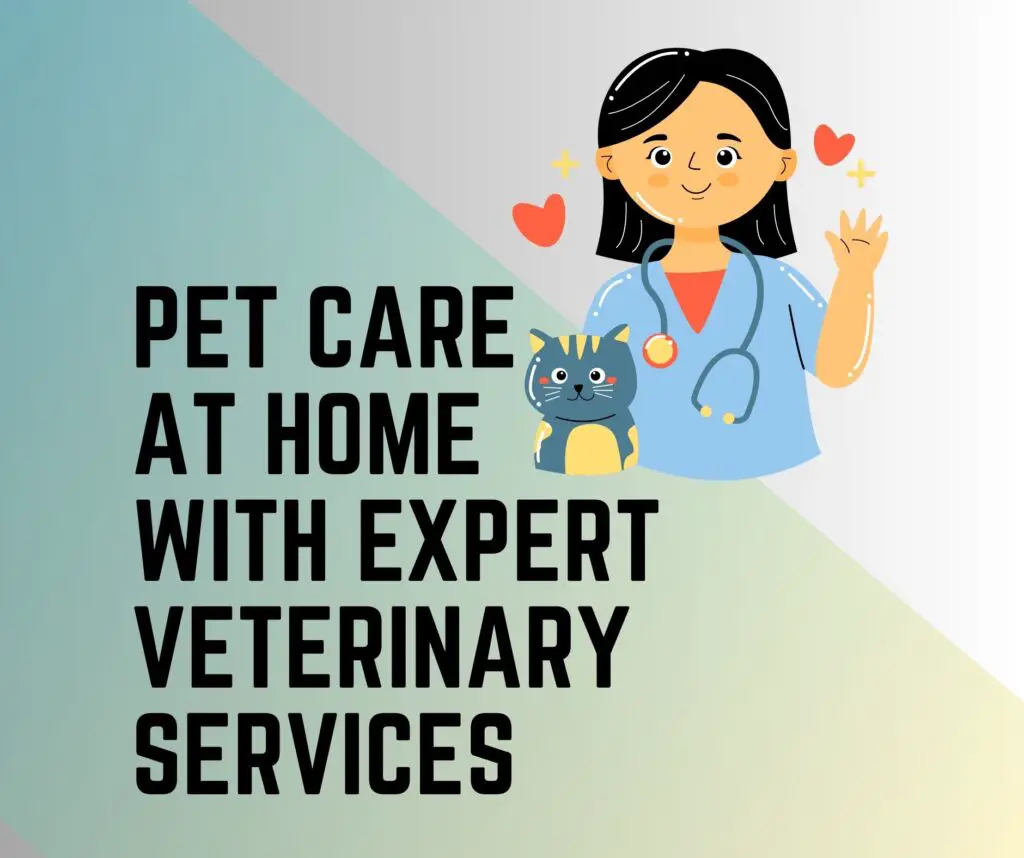Taking care of your pets is an important responsibility that requires you to be well-informed and up-to-date on the latest veterinary services. Caring for your pet at home can be a difficult task, especially if you need access to expert advice or quality veterinary care. That’s why it’s important to research local veterinarians to find one who offers the best possible service for you and your pet. When looking for a vet, ensure they are certified by the American Veterinary Medical Association (AVMA); a good example is a mobile pet vet, which also has all the necessary equipment to diagnose and treat potential health issues with your pet.
Additionally, look into what types of preventive measures they offer, such as vaccinations, flea/tick treatments, heartworm prevention, etc., as these will help keep your pet healthy over time. Ask about emergency services to know what type of support is available should something happen outside regular business hours. Some clinics provide 24/7 coverage, while others offer only limited hours. Caring for your beloved companion at home can become much easier when you bring the right vet on board.
Benefits of having home pet vet care
Home pet vet care can be very beneficial for you and your pet. For starters, it eliminates the need to travel to a veterinary clinic, which can be stressful for you and your pet. Home visits also provide more time for the vet to spend with your pet, allowing the vet to understand their behavior and health better. It can help them diagnose any issues better and more accurately.
Home visits are often less expensive than traditional veterinary clinics, as they don’t require the exact overhead costs. Finally, having a home vet visit gives you more control over the environment in which your pet is examined. It means you can ensure that your pet is comfortable and relaxed during their appointment, making it easier for them to receive proper care.
How to tell if It’s time for a veterinary visit
Knowing when it’s time for a veterinary visit is essential if you’re a pet owner. Observing your pet’s behavior and physical condition is the best way to tell. If your pet exhibits any signs of illness or injury, such as lethargy, loss of appetite, vomiting, diarrhea, coughing, sneezing, or limping, then it’s time for a vet visit.
If your pet has been exposed to toxins or ingested anything potentially harmful, like chocolate or medication, you should also immediately take them to the vet. It’s also essential to keep up with regular check-ups and vaccinations. Depending on the type of animal you have and their age, they may need more frequent visits than others.
For instance, puppies and kittens need more frequent visits than adult animals. And if you notice any changes in your pet’s behavior or physical condition that concern you – even if they don’t seem serious – it would still be wise to take them in for an examination just in case.
Knowing what questions to ask at a veterinary appointment
Regarding your pet’s health, it’s essential to be prepared for your veterinary appointment. Before you go, make sure to write down any questions or concerns that you may have about your pet’s health. It will help you remember everything during the appointment.
Some of the questions you should consider asking include: What is the best way to care for my pet? Can I make any lifestyle changes to improve my pet’s health? What vaccinations does my pet need, and when? Are there any signs or symptoms I should look for in my pet?
What are the potential risks associated with specific treatments or medications? How often should I bring my pet in for check-ups? If your pet has a chronic condition, ask about ways to manage it and what steps you can take at home to help keep them healthy. Asking these questions will help ensure you and your veterinarian are on the same page when caring for your beloved companion.
How to make your pet’s visit to the vet relaxing and enjoyable
Taking your pet to the vet can be a challenging experience for you and your furry friend. To ensure their check-up is as enjoyable as possible, you can do a few things. First of all, try to keep your pet calm by speaking in a gentle voice and offering them treats or toys.
If they’re anxious, try to distract them with something that will take their mind off the situation. You can also give them some of their favorite items to make them feel more at home. Additionally, keeping your pet company during the check-up is helpful so they don’t feel alone or scared. You can also award them with lots of love and affection after the appointment.
Aftercare advice: Keeping pets healthy post-consultation
After a pet consultation, following the veterinarian’s advice and taking the necessary steps to ensure your pet’s health is essential. It includes providing them with a balanced diet, regular exercise, and proper grooming. You should feed your pet the right amount of food at the correct times, as overfeeding can lead to obesity and other health issues. Exercise is also essential for keeping your pet healthy; ensure they get enough daily physical activity.
Grooming should also be done regularly; brushing their fur helps keep it clean and free of tangles, while trimming their nails prevents them from becoming too long or sharp. You should also keep up with regular check-ups and vaccinations; this will help catch any potential problems early before they become more serious. Following these tips will help ensure your pet stays healthy after consultation with your vet.
Addressing common concerns about safety in a home pet care visit
For home pet care visits, everyday safety concerns must be addressed. First, ensuring that the pet sitter is appropriately trained and certified in pet first aid and CPR is necessary. This will help ensure they can respond quickly and appropriately in an emergency. It is essential to ensure that the pet sitter has been thoroughly background checked, bonded, and insured.
This will provide peace of mind for both the pet owner and the pet sitter. Before their visit, you should discuss any specific safety protocols or procedures with the pet sitter. This could include not allowing access to certain areas of the home, or providing them with a key code for entry into the house. By addressing these common concerns about safety in a home pet care visit, both parties can feel confident that their furry family member will be safe while under the care of a professional pet sitter.
Mobile Birds Doctor aka Avian Vets: What they offer?
Mobile bird doctors aka avian vets, also known as avian veterinarians, offer a range of specialized veterinary services for birds on a mobile basis.
Here’s an overview of what mobile bird doctors can provide:
- General Health Examinations: Mobile bird doctors perform comprehensive physical examinations to assess the overall health and well-being of birds. They examine the bird’s feathers, beak, eyes, feet, and body condition, checking for any signs of illness, injury, or abnormalities.
- Disease Diagnosis and Treatment: Mobile bird doctors have the expertise to diagnose and treat various avian diseases and conditions. They may conduct laboratory tests, including blood work, fecal examinations, and cultures, to identify infections, nutritional deficiencies, or other health concerns.
- Emergency Care: Mobile bird doctors can provide emergency veterinary care for birds. They are equipped to handle critical situations, such as injuries, respiratory distress, egg-binding, or poisoning, and can administer immediate treatment or stabilization until further care is arranged if necessary.
- Vaccinations and Preventive Care: Mobile bird doctors offer vaccinations to protect birds against common avian diseases. They can provide advice on preventive care measures, including parasite control, nutrition, environmental enrichment, and hygiene practices to promote optimal health and prevent illnesses.
- Nutritional Guidance: Mobile bird doctors can assess the bird’s diet and offer guidance on proper nutrition. They can recommend appropriate diets, including a balance of seeds, pellets, fresh fruits, vegetables, and supplements, to ensure the bird receives the necessary nutrients for optimal health.
- Behavioral Consultations: Mobile bird doctors can provide advice on managing and addressing behavioral issues in birds. They can offer guidance on socialization, training techniques, and environmental enrichment to promote positive behavior and address behavioral problems such as aggression, feather picking, or vocalization issues.
- Husbandry Recommendations: Mobile bird doctors assess the bird’s housing and provide recommendations for creating a suitable and safe environment. They can advise on cage size, perches, toys, and other aspects of bird husbandry to enhance the bird’s well-being and prevent potential hazards.
- End-of-Life Care and Euthanasia: Mobile bird doctors can compassionately assist bird owners in making end-of-life decisions for their beloved avian companions. They can provide palliative care, pain management, and, when necessary, offer euthanasia services to ensure a peaceful and dignified passing for the bird.
Mobile Pet Care Market worth
The mobile pet care market is experiencing significant growth and is projected to be worth billions of dollars globally. The exact market worth may vary depending on factors such as geographical location, market trends, and the scope of services offered. However, the increasing demand for convenient and personalized pet care services is driving the market’s expansion.
Mobile pet care encompasses various services, including veterinary care, grooming, pet sitting, and pet training, all delivered directly to the pet owner’s location. The convenience and flexibility offered by mobile pet care have gained popularity among busy pet owners who value the convenience of professional services brought to their doorstep.
Factors contributing to growth and market worth of mobile pet care:
- Increasing Pet Ownership: The number of pet owners continues to rise globally, with pets becoming an integral part of many households. As the pet population expands, so does the demand for accessible and convenient pet care services.
- Changing Lifestyles: Busy schedules, urban living, and limited mobility have made it challenging for pet owners to access traditional brick-and-mortar pet care facilities. Mobile pet care addresses these challenges by providing on-site services that align with the needs and preferences of pet owners.
- Advancements in Technology: The integration of technology in mobile pet care, such as mobile apps, online booking platforms, telemedicine, and wearable devices, has enhanced the accessibility and efficiency of these services. Technological advancements contribute to the market growth and attract tech-savvy pet owners seeking modern solutions for their pets’ care.
- Focus on Pet Wellness: Pet owners are increasingly prioritizing the well-being and health of their pets. Mobile pet care services often emphasize preventive care, personalized attention, and a stress-free environment, catering to the growing demand for holistic and comprehensive pet care.
- Market Expansion: Mobile pet care is not limited to household pets like dogs and cats but also includes other companion animals such as birds, rabbits, reptiles, and exotic species. This broadens the potential customer base and expands the market’s worth.
Mobile pet care: What the future holds
There are many potential possibilities where mobile pet care is concerned. With the rise of technology, more and more pet owners are turning to mobile services for their pet care needs. Mobile pet care services offer convenience and flexibility and provide various specialized treatments that may not be available at traditional veterinary clinics.
For example, some mobile services provide laser therapy, acupuncture, and other alternative treatments that can help pets with chronic conditions or injuries. As technology advances, we can expect even more innovative solutions for mobile pet care in the future. From tele-medicine consultations to virtual reality training sessions, there are many possibilities for how mobile pet care will evolve in the years ahead.

Hi, There and Welcome to BirdsNews.com, is here to help you learn and care about pet birds. and this blog is a journal of everything I’ve learned.

